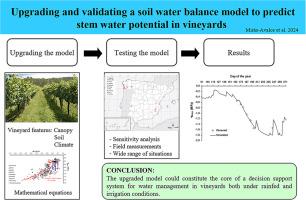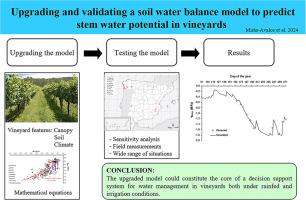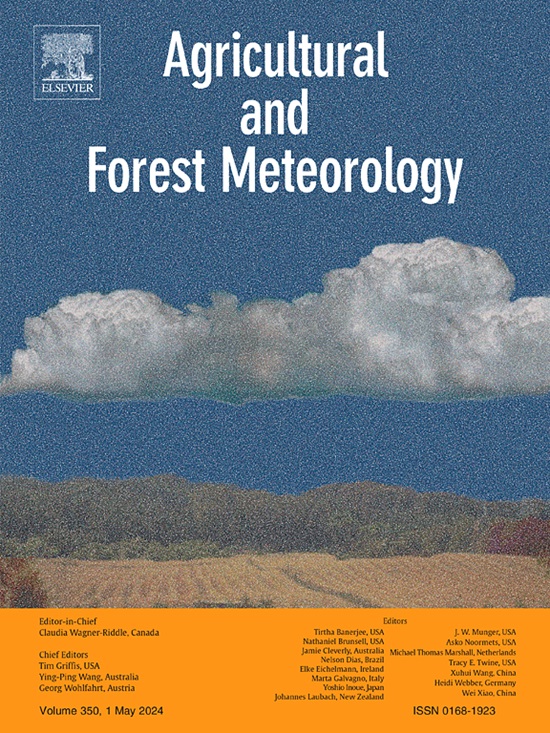升级和验证土壤水分平衡模型,预测葡萄园茎干水势
IF 5.6
1区 农林科学
Q1 AGRONOMY
引用次数: 0
摘要
高效的水资源管理对葡萄栽培的可持续性至关重要。决策支持工具可以就如何优化灌溉或在雨水灌溉条件下种植葡萄的可行性提供建议,但还需要可靠的算法来评估葡萄树的水分状况。在这种情况下,当前研究的目的是升级葡萄园专用的土壤水分平衡模型,将气象、土壤和葡萄树活力纳入将土壤可渗透水分转化为正午茎干水势(Ψstem)的方程中。分析了该模型对输入参数大小变化的敏感性。此外,该模型还在西班牙的多个葡萄园中进行了测试,这些葡萄园的葡萄品种(包括红葡萄和白葡萄)、砧木、株龄、土壤和气候条件以及水制度各不相同,总共有 129 种情况。除了叶片气孔导度开始下降时的可透水分量外,该模型对大多数输入量的变化仅略微敏感。此外,该模型令人满意地再现了Ψ茎在生长季中的变化,尽管它略微高估了测量的Ψ茎值,因为在大多数情况下,拟合回归线的斜率都小于 1,129 条回归线中有 76 条小于 1。不过,除 21 个数据集外,这些关系的决定系数都大于 0.9。平均误差平均为 0.024 ± 0.015 兆帕,均方根误差平均为 0.27 ± 0.01 兆帕。51 个数据集的一致指数大于 0.75,只有 3 个数据集的一致指数低于 0.5。尽管如此,观测值与Ψstem 模拟值之间的偏差并没有改变对葡萄树所承受的水分胁迫的分类。这一升级模型可作为葡萄园水分管理决策支持系统的核心,适用于雨水灌溉和灌溉条件。本文章由计算机程序翻译,如有差异,请以英文原文为准。


Upgrading and validating a soil water balance model to predict stem water potential in vineyards
Efficient water management is pivotal for viticulture sustainability. Decision support tools can advise on how to optimize irrigation or on the feasibility of growing grapes in rainfed conditions, but reliable algorithms for assessing vine water status are required. In this context, the aim of the current study was to upgrade a soil water balance model specific for vineyards by incorporating meteorological, soil and vine vigor in equations that transform the fraction of transpirable soil water into midday stem water potential (Ψstem). The model's sensitivity to variations in the magnitude of input parameters was analyzed. Furthermore, the model was tested in a broad scope of Spanish vineyards with different grapevine cultivars (both red and white), rootstocks, plant age, soil and climatic conditions, and water regimes, totaling 129 scenarios. The model was only slightly sensitive to variations in the magnitude of most inputs, except for the fraction of transpirable water at which leaf stomatal conductance begin to decline. Moreover, the model satisfactorily reproduced the evolution of Ψstem over the growing season, although it slightly overestimated the measured Ψstem values, as the slopes of the fitted regression lines were lesser than 1 on most occasions, 76 out of 129. Nonetheless, the coefficients of determination for these relationships were greater than 0.9, except for 21 datasets. Mean errors averaged 0.024 ± 0.015 MPa, while root mean square errors averaged 0.27 ± 0.01 MPa. The index of agreement was greater than 0.75 in 51 datasets, with only three datasets showing an index of agreement lower than 0.5. Nevertheless, the deviations between observed and simulated Ψstem values did not alter the classification of the water stress undergone by grapevines. This upgraded model could constitute the core of a decision support system for water management in vineyards, applicable to both rainfed and irrigated conditions.
求助全文
通过发布文献求助,成功后即可免费获取论文全文。
去求助
来源期刊
CiteScore
10.30
自引率
9.70%
发文量
415
审稿时长
69 days
期刊介绍:
Agricultural and Forest Meteorology is an international journal for the publication of original articles and reviews on the inter-relationship between meteorology, agriculture, forestry, and natural ecosystems. Emphasis is on basic and applied scientific research relevant to practical problems in the field of plant and soil sciences, ecology and biogeochemistry as affected by weather as well as climate variability and change. Theoretical models should be tested against experimental data. Articles must appeal to an international audience. Special issues devoted to single topics are also published.
Typical topics include canopy micrometeorology (e.g. canopy radiation transfer, turbulence near the ground, evapotranspiration, energy balance, fluxes of trace gases), micrometeorological instrumentation (e.g., sensors for trace gases, flux measurement instruments, radiation measurement techniques), aerobiology (e.g. the dispersion of pollen, spores, insects and pesticides), biometeorology (e.g. the effect of weather and climate on plant distribution, crop yield, water-use efficiency, and plant phenology), forest-fire/weather interactions, and feedbacks from vegetation to weather and the climate system.

 求助内容:
求助内容: 应助结果提醒方式:
应助结果提醒方式:


